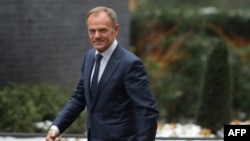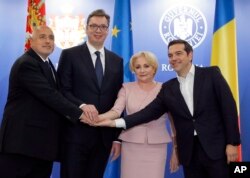A senior European Union official said Tuesday that a summit next month will reaffirm the "European perspective" of the Western Balkans, a region with fresh memories of war and a long history with Russia.
European Council President Donald Tusk's comments came as he started a weeklong tour to prepare for the May 17 summit of EU and Western Balkan leaders.
The agenda of the event, to be held in Bulgaria, is status talks on making Balkan countries EU members.
Last week, the European Commission said enough progress had been made for Albania and Macedonia's accession to begin. Tusk said the road to EU membership would be tough, but "worth the effort."
"The process will resemble more a hurdles race than a motorway. But full integration remains our common destiny," Tusk said at a news conference with his host, Albanian Prime Minister Edi Rama.
The 28 EU member states must agree unanimously for any country to become a member. The process of joining the EU has been a powerful driver of political and democratic reform in post-communist countries.
"I have no doubt that it's in the best interest of the EU and Albania that the entire Western Balkans region is fully integrated," Tusk said.
The summit will also be an occasion to discuss common security challenges, such as migrant smuggling, terrorism and organized crime, he said.
European Commission President Jean-Claude Juncker said Europe's door must remain open, and that he didn't want to see a return to war "in this extremely complicated region."
However, French President Emmanuel Macron has said he thinks the EU should not expand until Brussels itself undergoes reforms.
Later Tuesday, Tusk visited Montenegro. Along with Serbia, the Adriatic nation is slated to be next in line to join the EU, possibly in 2025.
Montenegro joined NATO last year despite Russia's opposition. Serbia, which Tusk visits next, maintains close ties to Moscow despite formally seeking EU membership.
Meanwhile, leaders from Romania, Bulgaria, Greece and Serbia met Tuesday in the Romanian capital to discuss regional issues, including ways to bring the Western Balkans "back to the European family where they belong," Bulgarian Prime Minister Boyko Borissov said.
Bulgaria, which currently holds the rotating EU presidency, supports Serbia joining the bloc.
The four leaders also discussed Kosovo's status as a country independent of Serbia. Kosovo declared independence a decade ago, but Serbia and some of its allies don't recognize it as a country.
"Without [a solution for] Kosovo, the Western Balkans can't move forward," Borissov warned.





